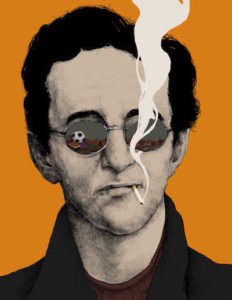
Once, I left behind two hundred books as a failed life—and all its accruements, from divorce to despondency with a dash of unemployment—dragged itself into the trash bin. I relocated from New Jersey to New York in 2012 weightless without all those books voracious readers cherish yet loathe to move. The void presented an opportunity, one which has played out slowly in the intervening years since the original abandonment. I’ve had the pleasure of building a new library, book by book, brick by brick, with cautious consideration.
Without my old library, I am free to roam within literature’s gray space and prowl the stacks. In this space, books are lost, as are writers, whether they’ve thrown in the towel or are merely ignored, the flip side of literary success: to produce a book that someone, anyone, deems worthy enough to purchase and consume. The literary gods weep when a book goes out of print, or when a writer fades from the rearview mirror, a hitchhiking vagabond cursing the vagaries of culture as the zeitgeist speeds past him. The literary gods don’t give fuck about us, until they do.
*
The search for emotional and spiritual connection within literature is a pedantic one, vague and unremarkable and at times colorless, spectral. More times than not, I read the literature produced by writers long dead. Living writers are my contemporaries, and their sonar through the daily torpor, like mine, feels for the walls. Dead writers are sources of vital answers needed to navigate the terminable life, provided their hearts were open; otherwise, they remain shuttered in the graves and gravestone pages the cadaverous bastards leave landlocked by cemetery dirt.
“The agony of her birth. Until then I had never seen courage. The courage to be something other than what one is, to give birth to oneself, and to leave one’s former body on the ground. And without having answered to anyone about whether it was worthwhile. ‘I,’ her fluid-soaked body was trying to say. Her nuptials with herself.”
“The Foreign Legion”—from an open heart.*
The sight of the Brooklyn Bridge from the N Train radiates good luck. I feel godly; I reach down to pull up the arches and wires to wear the bridge around my neck. I feel godly. I step over to the Statue of Liberty and tell her to her face that she should do for her self and let go of the worries of troubled men who, crash-landed on her shores in search of improved fortunes, turn to her for luck, for the emotional labor of superstition upheld. I feel godly, and then I spread open The Book of Disquiet.
“I imagine [Fernando] Pessoa, standing at the window of his small attic, on the fourth floor of a house in Lisbon’s Biaxa district, looking down over the haphazard agglomeration of roofs in the tawny evening light.”
Valeria Luiselli, from Sidewalks
“This is the first sunrise in the world. Never before did this pink-turning-yellow-turning-hot-white settle onto the façade with which the houses on the West, full of glassy eyes, face the silence that comes in the growing light. This time of day never took place before, nor did this light, nor did this being of mine. Tomorrow, whatever is will be something else, and whatever I see will be seen by recomposed eyes full of new vision”
Fernando Pessoa, from The Book of Disquiet
*
I’ve always wanted to work on a project named “Between Parentheses” ever since I saw the title emblazoned on Bolaño’s book, and so here I am, stealing from the dead in broad daylight, in your inbox. Let’s see what comes of the thievery. Welcome (again).